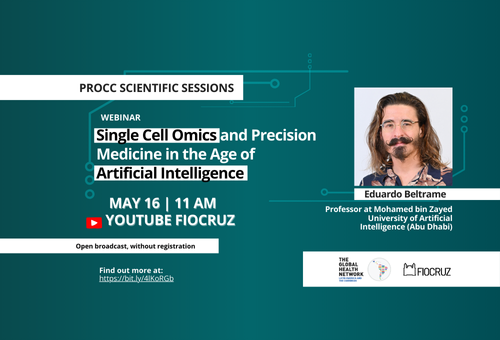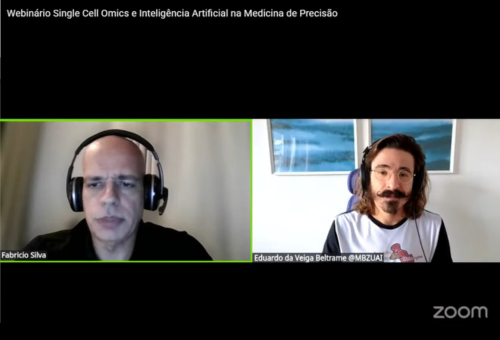AI in Precision Medicine is Focus of Fiocruz Webinar

On Thursday, 16 May, the Scientific Computing Programme at Fiocruz (PROCC), under the Vice-Presidency of Education, Information and Communication (VPEIC), held a webinar as part of the Scientific Sessions of PROCC in partnership with The Global Health Network Latin America and the Caribbean (TGHN LAC). The event, broadcast live on Fiocruz’s YouTube channel, brought together participants to discuss the advancement of single-cell technologies applied to health.
Entitled "Single Cell Omics and Precision Medicine in the Age of Artificial Intelligence", the session featured a talk by Eduardo Beltrame, Assistant Professor at the Mohamed bin Zayed University of Artificial Intelligence (MBZUAI), in the United Arab Emirates. The discussion was moderated by PROCC researcher Fabrício Alves.
AI models help interpret large volumes of biomedical data
During his talk, Beltrame explained how combining single-cell analysis technologies and artificial intelligence (AI) models is already contributing to precision medicine. According to the researcher, AI is essential for managing the large volume of biological data generated, allowing real biological variations to be distinguished from technical ones by integrating extensive databases. “With enough data, large models tend to win,” said Eduardo.
Growth of the field and machine learning in health
He highlighted the rapid evolution of the field: “There has been exponential growth. In eight years, we’ve seen ten times more published papers and a hundred times more data available.” According to Beltrame, machine learning tools (such as those in Python) have proven effective in interpreting these data on a large scale through models capable of integrating multiple types of biomedical data.
Accessible solutions to apply AI in public health
One key topic addressed in the webinar was the feasibility of implementing these technologies in public health systems. The professor presented more accessible experimental methods for generating data in single-cell studies. One example was a technique known as in situ barcoding, which enables identification of each cell’s genetic material without isolating them individually. “You don’t need specialised equipment, just standard lab tools. From an experimental point of view, this technique has the potential to significantly reduce the cost of single-cell data generation,” Beltrame said.
Home collection and inclusion of remote populations

He also mentioned improved logistics for remote areas: “There are already good logistics solutions available. It’s possible to collect samples at home without needing refrigeration,” Eduardo noted.
Invitation to students and collaborations with Brazil
During the session, Beltrame answered questions and emphasised the importance of involving diverse populations in studies to ensure more representative results. He invited students and researchers to explore the MBZUAI admissions process, with full scholarships open until 31 May:
🔗 https://mbzuai.ac.ae/study/admission-process/
He also encouraged participation in a regular three-hour workshop on the topic, reaffirming his interest in establishing collaborations with Brazilian researchers.
Register your interest in the workshop here: 🔗 https://forms.office.com/r/Lp3TkyAFvT
The PROCC/TGHN LAC Scientific Sessions are held regularly to disseminate knowledge, foster institutional collaboration, and promote emerging topics in science and technology for public health
